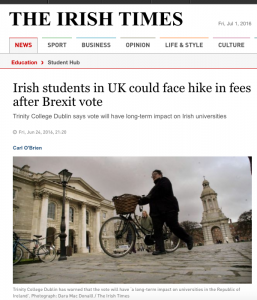Building bridges (or life after Brexit)
“All of a sudden my plans seemed not so sure anymore, and it was easy to see how current and prospective international students might feel the same”
Melisa Costinea, originally from Transylvania, Romania, is studying PGDip Social Research Methods at University College London, and has previously studied MA Film and Visual Culture – Sociology at University of Aberdeen. She is currently interning for UKCISA, and here she writes about her reaction to the Brexit vote, and how UKCISA is working to support international students.
Everyone will remember what they did on the 23rd of June of 2016 as one would remember, for example, where they were when the Berlin Wall fell in 1989. I think the first thing that one should do in the aftermath of Britain’s EU Referendum result is acknowledge the immense impact that this has had on so many people, including an international student such as myself. Along the way, I will also give you a glimpse into how UKCISA is responding to the situation.
Read More

